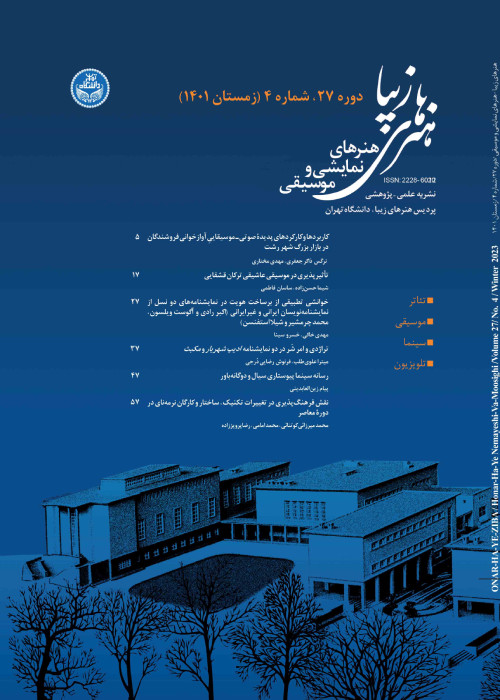The Reflection of Hegel's Thought in Sophocle's Antigun
Author(s):
Abstract:
Hegel’s interpretation of Sophocles’ Antigone is surely one of the best we can find in literature or philosophy. In his book “Phenomenology of Spirit”, Hegel goes through insightful interpretations of Antigone and analyzes this work based on his own system of philosophy. Hegel is one of the few systematic philosophers who made a universal body of philosophy which is supposed to overwhelm all humanity’s questions and problems. Therefore in order to understand Antigone based on Hegel’s thoughts we should firstly get familiar with the basic ideas of Hegel. It seems that one of the main questions which can be regarded as the beginning point for Hegel is the relationship between God and human. In Christianity, God is in the shape of human and in Christian theology God is incarnated in a human being. The quality of God’s incarnation in Christ was irrational to young Hegel. He was thinking how it is possible that Infinite God can be incarnated in finite physical body of a human called Christ. This problem at the beginning is purely theoretical however later it becomes all his philosophy and inspires his absolute idealism. Theoretically speaking, the problem of God’s incarnation in Christ is that when we state it philosophically, it is the relation of the Infinite with the finite and when we state it politically it changes into the relation of the Government and an individual. In his book, Phenomenology of Spirit and also in his Aesthetics, Hegel presents inspiring ideas regarding the tragedy. Most western researchers believe that since Aristotle’s time, none of the European thinkers have been able to explain comedy and tragedy the way Hegel has done and his deep points of view have made his post-thinkers reflect on them. In Hegel’s view, Sophocles’ Antigone is a sample of Greek tragedy. In his famous work, Philosophy of Fine Arts, Hegel deals with the explanation of the tragedy of Antigone. Therefore, in this paper, considering our available means, the authors plan to portrait the rise and fall of the moments of tragedy and explain the event, “conscience malheureuse”, portrait “Tragic Clash” and rethink for moments. The gods, especially Zeus, are often dispensers of fate, sometimes superior to it, and sometimes constrained by it. Zeus and fate somehow determine events, but men have free will: fate exploits the character of men to maintain cosmic order. The Greeks are in harmony with nature; then a rift opens up between freedom and fate necessity; finally, Christianity begins the reign of providence. Hegel is also influenced by the Greek concept of fate, especially moria (‘allotted portion (especially of death), fate’, also personified s moira, ‘the Fates’), which approach in epic, tragedy and, especially in the guise of ananke (‘NECESSITY’), in pre-Socratic philosophers (especially Heraclitus). Thus, in this paper through the method of analytical-descriptive we intend to find out Hegel’s main philosophical problem and then we justify why Hegel had turned to Greek playwrights specifically Sophocles’ Antigone. At the end, we will discuss the idea of historical destination.
Keywords:
Language:
Persian
Published:
Honar-Ha-Ye-Ziba: Honar-Ha-Ye Mosighi Va Namayeshi, Volume:17 Issue: 45, 2012
Page:
47
magiran.com/p1093945
دانلود و مطالعه متن این مقاله با یکی از روشهای زیر امکان پذیر است:
اشتراک شخصی
با عضویت و پرداخت آنلاین حق اشتراک یکساله به مبلغ 1,390,000ريال میتوانید 70 عنوان مطلب دانلود کنید!
اشتراک سازمانی
به کتابخانه دانشگاه یا محل کار خود پیشنهاد کنید تا اشتراک سازمانی این پایگاه را برای دسترسی نامحدود همه کاربران به متن مطالب تهیه نمایند!
توجه!
- حق عضویت دریافتی صرف حمایت از نشریات عضو و نگهداری، تکمیل و توسعه مگیران میشود.
- پرداخت حق اشتراک و دانلود مقالات اجازه بازنشر آن در سایر رسانههای چاپی و دیجیتال را به کاربر نمیدهد.
دسترسی سراسری کاربران دانشگاه پیام نور!
اعضای هیئت علمی و دانشجویان دانشگاه پیام نور در سراسر کشور، در صورت ثبت نام با ایمیل دانشگاهی، تا پایان فروردین ماه 1403 به مقالات سایت دسترسی خواهند داشت!
In order to view content subscription is required
Personal subscription
Subscribe magiran.com for 70 € euros via PayPal and download 70 articles during a year.
Organization subscription
Please contact us to subscribe your university or library for unlimited access!


